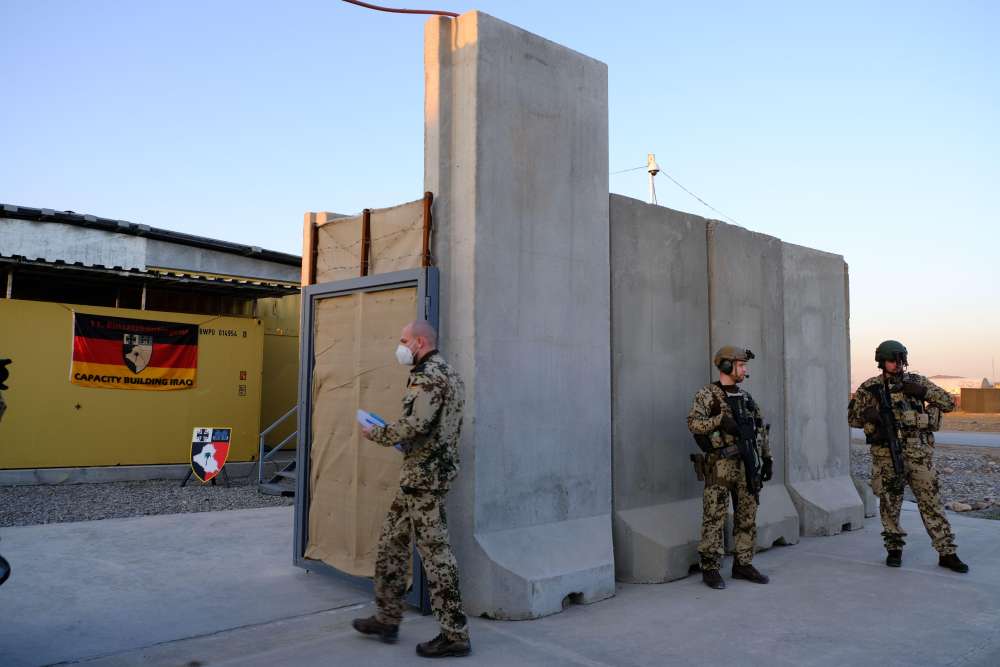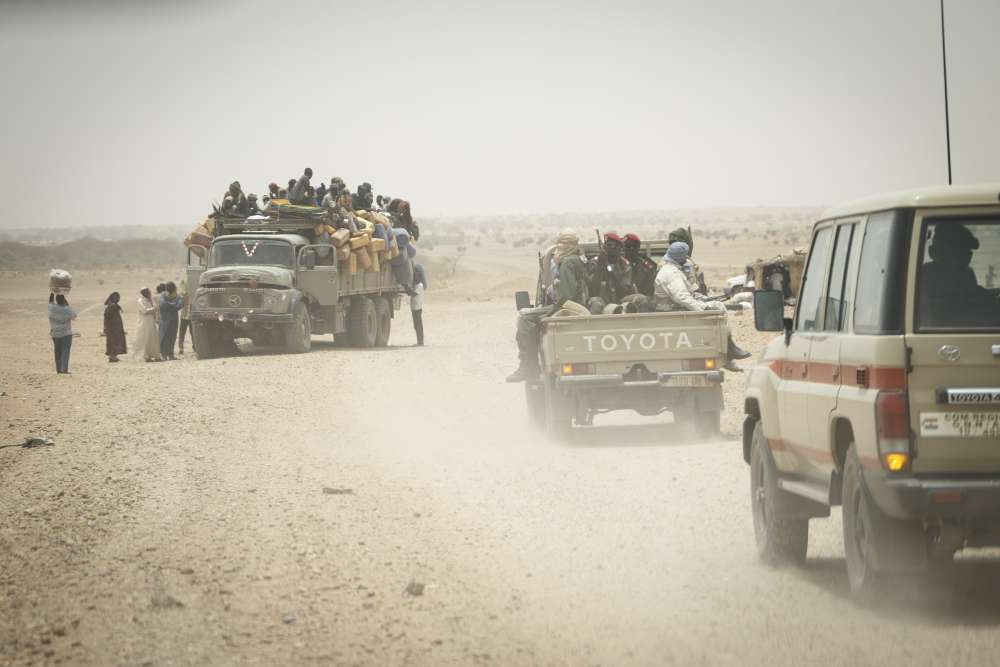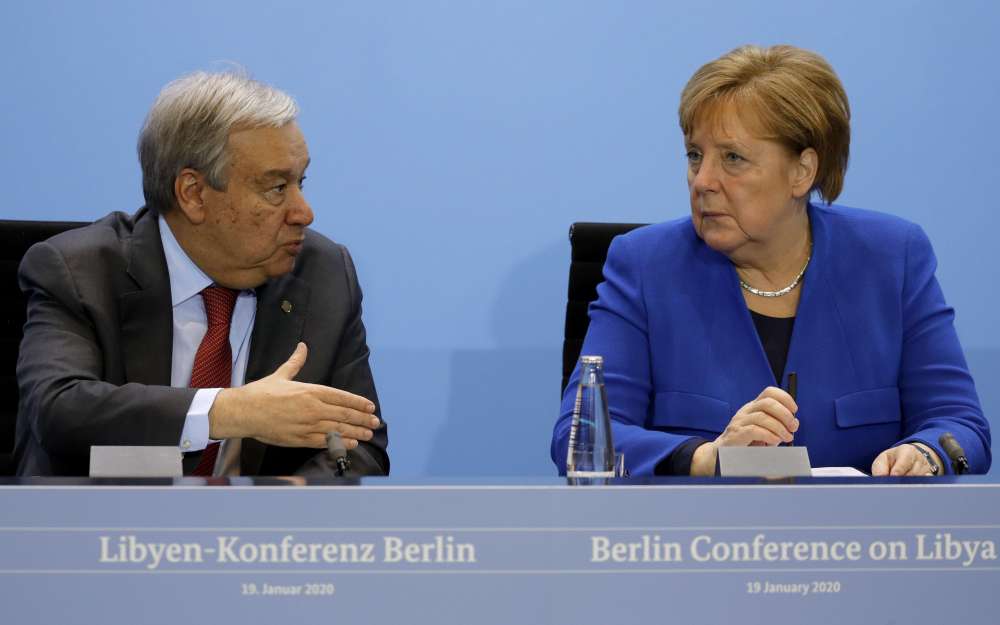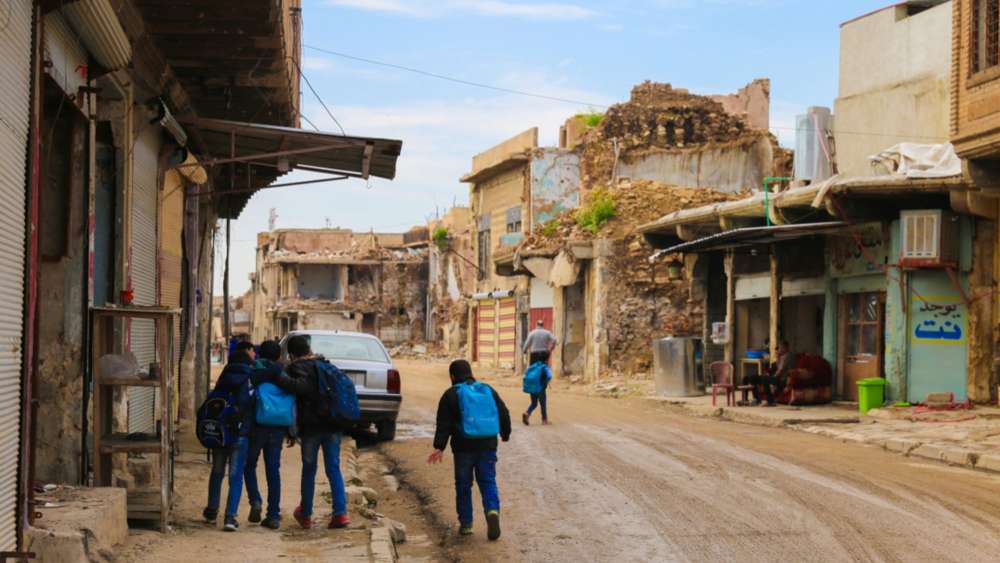Germany’s Role as a Global Leader in Stabilization

German Bundeswehr soldiers wait for the arrival of former German Defense Minister Christine Lambrecht during her visit to Erbil, the capital of the Kurdistan Region in Iraq, in early January 2022. (GAILAN HAJI/EPA-EFE/Shutterstock)
Stabilization can be one of the most effective ways to help countries prevent or emerge from violent conflict. Germany already leads the way – and should expand on this role with its new security strategy.
Over the last two decades, stabilization has emerged as a core pillar of the global multilateral system, alongside humanitarian action, development and peacekeeping. Starting in the 1990s, the international community has launched major operations involving multiple partners in East Timor, Somalia, the Democratic Republic of Congo, Afghanistan, South Sudan, Syria, Iraq, Libya, and Yemen.
Although stabilization operations vary in size and approach, most focus on one of three aims: de-escalating tensions in unstable areas before they erupt into armed conflict; building the resilience of vulnerable communities to resist the spread of violent extremism; or jumpstarting and accelerating recovery in post-conflict environments.
When done well, stabilization has become one of the most effective ways to help countries prevent or emerge from destructive cycles of conflict. Stabilization, however, does not always succeed – and when it fails, the reasons are usually a combination of a lack of funding, poor coordination, and ineffective implementation.
Key Points:
- Multiple crises demand that a global ‘stabilization champion’ assumes a leadership role in international responses to instability and conflict. Germany is well positioned to fill that role.
- Stabilization operations should aim to accomplish one or only a few objectives. And consistency is key: a plurality of frameworks, platforms and implementers usually hampers effectiveness.
- To maximize their impact, international donors should adopt a whole-of-government approach in their stabilization efforts. Germany’s integrated support model can serve as an example in this regard.
- If something is not working, stabilization actors should quickly adjust course. Germany should continue its leadership and support others in adapting their operations when these do not reap the intended results.
Much has been learned about what does and does not work. With the world facing multiple crises, and with many more on the horizon, the multilateral system needs a global stabilization champion — a country that will use its resources and leadership to work in partnership with others to implement these lessons.
Germany is already a global leader in stabilization and, as it prepares to release its first National Security Strategy, is perfectly positioned to continue in this role. Germany’s track record makes the case for that.
An Impressive Track Record
In Libya, Berlin’s efforts have been vital to de-escalating tensions between belligerent parties in Libya’s east and west and to addressing the grievances of marginalized communities in the south. In partnership with the UN’s Libya mission, Germany has also led the Berlin Process, which convenes key Libyan and international stakeholders to devise a way to end Libya’s ongoing civil war.
In Africa’s Lake Chad Basin, where the Boko Haram insurgency has impacted nearly 30 million people, Germany has been a leading contributor to the UNDP Regional Stabilization Facility. Since 2019, the Facility has supported the return of over 70,000 internally displaced persons and financed 4,000 initiatives aimed at improving basic services and infrastructure. In communities devastated by violence, these efforts have helped boost livelihoods and provide alternatives to extremism.
In Iraq, Germany has been a leader of international efforts to stabilize areas liberated from ISIS. In conjunction with the United Arab Emirates, Germany has co-led the Global Coalition Working Group on Stabilization.It has also, together with the Iraqi government, co-chaired the high-level stabilization working group inside the country, bringing together more than 20 donor countries. And Germany helped to establish the Funding Facility for Stabilization, a financial assistance program directed by the Iraqi government and managed by UNDP, which is considered one of the most successful stabilization operations to date. It has laid the conditions for and facilitated the safe return of three million Iraqis to their homes even as ISIS still controlled other cities. Once ISIS was expelled from Iraq, another two million Iraqis have been helped to return to their homes and restart their lives.
» Countries in need of stabilization are almost always overwhelmed by a staggering number of problems and priorities. «
Toward Successful Stabilization
As the global stabilization champion, Germany can help to ensure that the operations launched by the international community are set up for success. Several key lessons can inform this effort.
For one, stabilization operations should aim to accomplish one or at most only a handful of objectives. Their aim should be to solve a problem that, if not solved, will significantly delay or derail future progress toward stability and peace.
Second, success is far more likely if there is only one stabilization framework, one coordination platform and one implementer. In countries like Iraq, Syria and Libya, Germany is showing the way by helping to build broad coalitions and deploy resources through centralized facilities.
Third, countries in need of stabilization are almost always overwhelmed by a staggering number of problems and priorities. Donors that adopt a whole-of-government approach in their stabilization efforts reduce the pressure on the host government and have far more impact than those that do not follow this course. Through its strong integrated support model, Germany is already showing how this can be done.
Fourth, successful stabilization depends on mechanisms for managing multiple and extreme risks. Every step forward in stabilization is usually counterweighted by three, four or even more mistakes. Successful stabilization actors are transparent about what is not working and pivot quickly in new directions. Germany’s confident leadership has been key to adapting operations when these were under-performing.
» German leadership and commitment is key to ensuring that stabilization continues to be a core pillar of our multilateral system. «
Even before Russia invaded Ukraine in February 2022, the UN Secretary-General warned of a world stricken with crises brought on by the pandemic, intensifying conflict, record-breaking displacement, and climate emergencies — all in the context of rising tensions among great powers.
Amid this tumult, now more than ever, vulnerable countries need assistance to de-escalate tensions, counter violent extremism, and lay the foundation for recovery, reconstruction and reform. This is what stabilization, when done right, can provide.
Those of us who have had the privilege of working with Germany during stabilization operations know that German leadership and commitment, which we hope is reinforced and expanded through the country’s new National Security Strategy, is key to ensuring that stabilization continues to be a core pillar of our multilateral system.
Lise Grande
President and CEO, United States Institute of Peace (USIP)
Weiterlesen

German Security Policy in Africa: New Enemy, Same Mistakes?
Despite the rising power competition with Russia in Africa, Western countries should avoid repeating their mistakes of past counter-terrorism and stabilization campaigns. How threat inflation and no-strings-attached security assistance hinders the chances for peace.

“Progress in Peace Processes Often Results from Cumulative Efforts”
In a world marked by rising geopolitical tensions, Germany should use its international convening power and unique strengths as a state mediator and donor to support professional peacemaking practice.

Prioritizing the Protection of Civilians in National Security
When drafting security policy, those most affected by conflict are often missing from the equation. Applying a protection lens to Germany’s upcoming security strategy would be a way of putting civilians first.